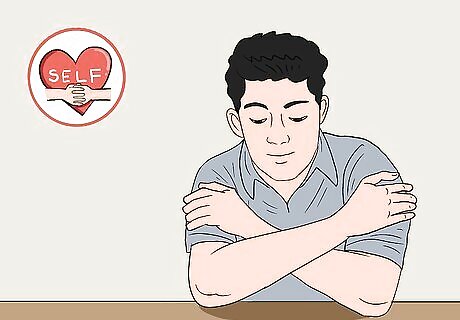
views
Communication

Pick a time when they’re calm and focused on you. Opening up to your parents can be super stressful, but you can do it! Tell your parents you need to talk to them and suggest a time when you’re both free. Make sure there are no distractions around, such as a TV, so they pay attention to you. Say, “Mom, I really need to talk to you. Can we sit down together after dinner tonight?” If your parents won’t talk to you, find an adult you trust to confide in, like your grandparent or a school counselor. It’s not fair that your parents are unresponsive, but it probably has nothing to do with you. Chances are, they have struggles of their own.

Start the conversation by asking them to listen and be open-minded. It’s possible your parents have no idea that you feel unloved. They may become defensive or might feel like they need to comfort you once you start opening up. Specify at the beginning of the conversation that what you’re going to say may be hard to hear and that you just want them to listen. You might say, “I need to talk to you about some problems I’ve been having lately. You might feel upset when you hear what I have to say, but please just listen until I’ve gotten it all out,” or “I really just need you to be there for me right now. I hope you’ll hear me out and try to understand me.”

Tell your parents how you feel. It’s scary to talk about your feelings, but be honest with them. Explain that you feel unloved and why. Then, tell them what you want them to do differently. You could say, “I feel like you always criticize me and like nothing I do is ever right. I just want you to be proud of me and for you to tell me you love me." It may be hard to talk about these things with your parents to begin with, so maybe try talking through your feelings with somebody you trust who will be fair-minded and listen to you.

Listen to what your parents have to say in response. After you’ve gotten it all out, give your parents a chance to explain how they feel. Try to understand things from their point of view, but remember that it’s okay to disagree with them. Hopefully, you can find some common ground. Don’t interrupt your parents while they’re talking because it’ll likely start a fight. If they say something super upsetting, try counting to 10 or picturing your happy place until they’re done talking. If you feel your parents don't love you for who you are, there's likely a reason you feel that way. That doesn't mean your parents really don't love you, but your reason for feeling this way could be valid.

Stay calm if your parents start to yell or try to fight. You’re probably really upset, so it's only natural to want to yell or fight back. However, this will likely make the situation worse, and you’ll just end up feeling awful. Instead, walk away from the situation if you can. If you can’t leave, picture your happy place or count your breaths to help you relax. Consider meditating or praying to help you center yourself.

Ask your parents about their childhood to better understand them. It’s hard to picture your parents when they were young, but it could help you make sense of their behavior now. Encourage your parents to tell you stories about when they were growing up. Pay attention to the expectations their parents had for them, the struggles your parents had at school, and other issues. For instance, your parents may pester you about your grades because they wish their parents had pushed them academically. Similarly, your parents may want you to play sports because they loved them, even though you hate sports. You could also learn that your parents didn’t have a great relationship with their own parents. They may just not realize that they’re not showing you love properly. Hopefully, this insight could help you change things with them.

Set boundaries with your parents if they don’t treat you well. You deserve to feel loved, but you can’t control your parents’ actions. Decide what bothers you most, then ask your parents to stop these behaviors. Tell them that you will not respond or will walk away when they treat you this way. Start with small changes, and over time you can change your relationship. Use “I” language so your parents don’t get defensive. For instance, say, “I feel bad when you yell at me, so I’m not going to respond when you yell,” instead of, “You always yell and hurt my feelings.” You could say something like, “I know you don’t agree with my choices, but they’re my decisions. When you criticize me, I’m going to stop listening.”
Relationship Help

Show love to your parents so they know you care. It’s really hard to be affectionate with a parent who isn’t giving you the love you need, so only do what feels comfortable to you. Start by telling your parents that you love or appreciate them. Additionally, hug or kiss your parents if that feels right to you. These actions show your parents you love them, which may help them be more affectionate with you. Say something like, "I love you" or “I appreciate you.” Do nice things for your parents to show you love them. You could also write them a nice letter or might make them a small gift, such as a painting or photo slideshow. Don’t do anything that makes you feel uncomfortable. It’s okay if you don’t want to touch your parents because of how they’ve treated you in the past.

Offer to do household chores if you still live at home. Taking care of a home is really hard, and your parents are probably tired after a long day. You likely also have a lot on your plate, but try to find time to help your parents out around the house if you live at home. This creates a sense of unity in your household, which could help improve your relationship with your parents. For example, offer to wash the dishes if your parents cooked dinner or take out the trash when it fills up. Similarly, you might help with the laundry or lawn care duties.

Follow each other on social media to get a peek into your private lives. You probably don’t want your parents poking their nose into your business, but studies show that social media can improve parent-child relationships. Just connect with them over 1 platform where you post things you feel comfortable with them seeing. Take a few moments every day to check what they’re posting and see how they reacted to your posts. For example, you might post on a Facebook profile that your parents can see. You can even limit what they see if you prefer. It’s okay to save some posts for just your friends.

Invite your parents to do a fun activity with you. Laughing and playing together is the perfect way to feel closer to your parents. Choose an activity you and your parents enjoy. While you’re together, try to let go of past hurts and conflicts for the moment. Here are some ideas: Play a board game. Go for a hike or bike ride. Bake a family recipe. Toss or kick a ball around your yard or a local park. Stream a movie together. Go on a scavenger hunt.

Focus on what you have in common with your parents. Feeling rejected by your parents is a painful experience, and it’s easy to focus on how different you are from each other. However, you likely have something in common with your parents, even if it’s super small. Try to find some similarities between you and use them to build a connection with your parents. Keep your conversations focused on your commonalities so you’re less likely to have conflict. As an example, maybe you both like to watch cooking shows, enjoy reading, or play an instrument. It doesn’t have to be a big thing to bring you together.

Build trust by being consistent. Your parents should love you no matter what, so it’s not your fault if they mistreat you. At the same time, you might accidentally send your parents mixed signals if you’re sometimes nice to them but angry or withdrawn at other times. Try to be open with your parents, even when you’re struggling, so they know you want a good relationship with them. For instance, speak to your parents when you enter the same room as them. If you promise to do something, always follow through so they know they can trust you. If you’re upset about something, tell them instead of avoiding them or snapping at them. Say, “I’m feeling frustrated today and just need some time alone,” or “Today has been terrible, but I don’t want to talk.”

Accept your parents’ differences so they’ll hopefully accept you. Just like you have unique qualities that make you awesome, your parents have their own interests and talents. Your parents might not be the type of people you’d want to be friends with, but that's okay. Do your best to respect who your parents are, even if you don’t like it. In time, they may learn to treat you with the same kindness. As an example, you might disagree with your parents about politics. Instead of arguing with them all the time, just accept that this is a topic where you don’t agree. Similarly, maybe your parents prefer to dress like they’re going to a country club, but you prefer an edgier look. Don’t make fun of their clothes because it’ll just cause more conflict.
Self-care

Stop trying to please your parents and just be yourself. Feeling rejected by your parents is an awful experience, but pretending to be someone you’re not won’t make it better. You’re a wonderfully unique person and deserve to live a life you love. Don’t get caught up in what your parents want from you. Pursue your own interests and you’ll find your true family. Do your best because that’s all you can do. Your best is enough, so don’t let your parents make you feel bad for not doing the impossible.

Don’t take your parents' opinions personally because this is really about them. It hurts when your parents cut you down, and you don’t deserve to be treated that way. You may feel like you did something wrong, but your parents are the problem. Try to block out what they say or do because it has nothing to do with you. You’re never the cause of abuse. For instance, your parents might say, “I wouldn’t yell at you if you weren’t so lazy.” That’s a lie. They’re taking their emotions out on you and are accusing you of being lazy as an excuse.

Accept that you cannot control your parents' behavior. You cannot force them to love and accept you. While you may have an ideal of what you want your parent-child relationship to be, your parents' behaviors are not likely to change overnight. Learn to let go of what you cannot control. Focus on accepting and loving yourself. While this may not change your parents, it will help you to find strength in yourself.

Release your painful emotions through a creative outlet. Research suggests that the arts are a great option for releasing stress and negative emotions. Any type of creative expression helps, so pick something that works for you. Write, draw, paint, dance, or make crafts to help boost your mood. A study showed that skill level doesn’t matter, so don’t worry about if your creations are “good” or not. Just try to have fun.

Create a support network of friends, mentors, or other family members. Your parents aren’t your only family, so seek out people who make you feel loved. Start with your other family members, like your grandparents, aunts, uncles, or cousins. Don’t stop there! Connect with teachers, coaches, and other mentors, and spend time with friends who feel more like siblings. The family you choose is stronger than the family you were born into. Text or chat with your chosen family daily so you feel heard and appreciated. Try to spend as much time with your support network as you can. For instance, attend after school events with friends and spend the night with friends or other family members.

Build a fulfilling life outside your home. Your parents can take up your entire world sometimes, but don’t let them. Look for other things that bring you joy, like playing in the band at school, attending debate tournaments on weekends, or joining a book club. Take classes to build skills you want, like gardening or painting. Focus on things that bring you joy. Feel up your calendar as much as possible so you don’t have to spend as much time with your parents. If you live at home and your parents try to control you, try to find things they’ll approve of, like school clubs or events, religious gatherings, or time with family members.

Talk with a counselor to help you cope. You may not be able to deal with your painful emotions alone, and that’s totally okay! A counselor can help you identify what needs are not being met, better ways to cope, and ways you can heal. If you’re in school, make an appointment with a school counselor. If you’re an adult, make an appointment with a local therapist online or over the phone. Your therapy sessions may be covered by insurance, so check your benefits. Consider asking your parents to enroll in family therapy with you.

















Comments
0 comment